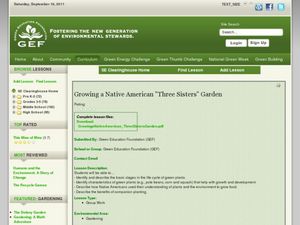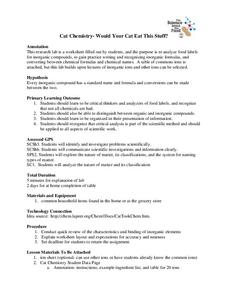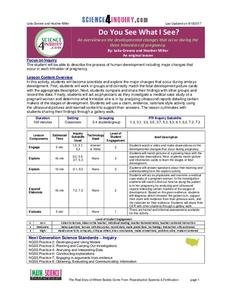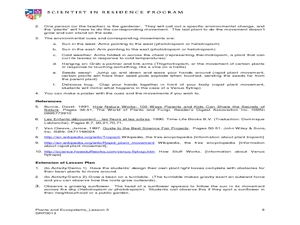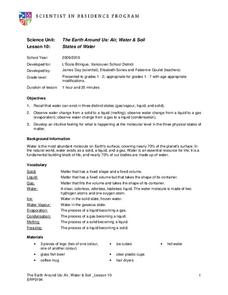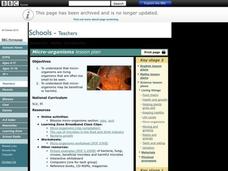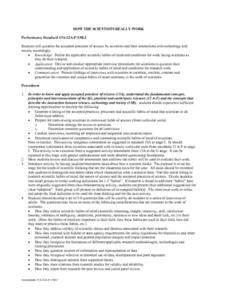WolfQuest
The Return of Gray Wolves to Yellowstone National Park: Right or Wrong?
Should gray wolves be removed from Yellowstone National Park? After researching the complex relationships between the various habitats and species at Yellowstone National Park, including humans, class members take a position on the...
Wild BC
Is Climate Change Good for Us?
Is it really that big of a deal if the global climate undergoes a little change? Young environmentalists consider this very question as they discuss in small groups the impact of different climate change scenarios on their lives, their...
Curated OER
Growing a Native American "Three Sisters" Garden
Students explore plant life by creating their own gardens in class. In this food growing lesson, students discuss the types of gardening methods Native Americans used in order to keep healthy. Students plant corn seeds in their school...
NOAA
What's the Difference?
Due to the isolation of seamounts, their biodiversity offers a great deal of information on the development of biological and physical processes. Pupils use simple cluster analysis to rate the similarity and differences in biological...
Curated OER
Money Management Part II: Checking Accounts
Having money is great, learning to manage it wisely is imperative. First, the class has a discussion on the value and convenience of having a checking account. Then, they practice filling out deposit slips, keeping an account register,...
Curated OER
Exploring Careers in High Demand Industries
The class works in teams to research and report on careers in high growth industries. They consider industrial growth of a particular career, education needed, current demand for that skills, and average salary. They use their findings...
Critical Thinking Cooperative
Doing Our Share
Whether at home or in the classroom, each member of a community has certain responsibilities they must tend to. With the help of the children's story Piggybook by Anthony Browne, kids learn how to assign jobs in a fair and safe manner...
Middle Tennessee State University
The Invention of the Telephone
All of the people in your class would agree that life would be different without the invention of the telephone! Study Alexander Graham Bell's most famous and influential invention through the primary source document of his sketch of the...
Curated OER
Levers and Wedges in the Human Body
Students identify the various parts of the body that serve as wedges and levers, identifying the fulcrum for each body lever. They bite into carrots and apples to analyze how their jaws and teeth work, then complete three worksheets that...
King County
Reproductive System
It's every health and science teacher's favorite subject to cover: the reproductive system. This comprehensive lesson introduces adolescents to the reproductive anatomy of men and women with the help of a series of diagrams, discussions,...
Illustrative Mathematics
Bank Shot
Young geometers become pool sharks in this analysis of the angles and lengths of a trick shot. By using angles of incidence and reflection to develop similar triangles, learners plan the exact placement of balls to make the shot....
University of Georgia
Would Your Cat Eat This Stuff?
Processed foods use inorganic compounds for flavoring and preservation. This take-home laboratory challenges scholars to find 20 different compounds identified on the labels of foods to list on their data collection sheet. The activity...
Teach Engineering
Storing Android Accelerometer Data: App Design
There's an app for that! Pupils learn to build an app that will store data on an Android. The lesson introduces class members to the tiny database, TinyDB, for Android devices. A video tutorial provides an example that uses the TinyDB in...
Virginia Department of Education
A Designed Organism
How can you encourage pupils to demonstrate creativity while still meeting the objective of applying technical knowledge? This activity is your answer! Scientists will create an imaginary creature and prepare a graphic organizer with...
Curated OER
Plant Parts and their Function
Discover why plants are important to our world. View plant parts and categorize them as stems or buds. Students do a cut and paste of pictures of plants into correct categories. Students also plant a carrot top,and record the growth and...
American Chemical Society
What is Density?
Density: the reason a giant pumpkin will float, but a tiny cranberry won't. Lesson begins with a demonstration of two of the same-sized cubes having different densities. Then pupils take eight cubes, each of the same size, and have to...
Science 4 Inquiry
Do You See What I See?
In only nine months, a small group of cells grows into a fully developed baby. Pupils learn about the development of an embryo to a fetus to a baby. They identify each step of weekly development. Young scientists look at ultrasounds to...
Purdue University
Simple Machines – Dog Gone It!
How can people use simple machines to solve real-world STEM problems? Learn about simple machines using a hands-on, project-based learning activity. First, pupils investigate and evaluate simple machines. Then, they receive a task that...
Curated OER
Plants Alive! How Plants Grow and Move
Young scholars explore how plants move in response to the environment. In this plant lesson, students engage in three different experiments to investigate how plants grow and move. Resources available in English and French.
Curated OER
Rubber Duckies and Ocean Currents
Students explore marine life by conducting a rubber duck experiment. In this water currents lesson, students practice identifying latitude and longitude coordinates on a map and define the currents of major oceans. Students discuss the...
Curated OER
States of Water
Students investigate the 3 states of matter. For this physical science "matter" lesson, students observe and participate in a number of demonstrations involving melting and freezing water. Students observe the effect heat has on changing...
Curated OER
Using Abiotic and Biotic Parameters to Monitor Air Quality
Students identify the abiotic factors that influence a river or stream and the organisms that live in it. They measure several abiotic and biotic parameters to gauge water quality. Students examine the biotic environment by identifying...
Curated OER
Micro-Organisms
Students investigate microscopic life by viewing video clips. In this organisms instructional activity, students view photographs and video clips on the internet of micro-organisms and discuss the harms and benefits of the creatures. ...
Curated OER
How The Scientists Really Work
Students question the accepted practices of science by scientists and their interactions with technology and society. They devise and conduct appropriate interview procedures for scientists to question their understanding and...
Other popular searches
- 4th Grade Life Science
- Life Science Inquiry
- Life Science Vertebrates
- Life Science Experiments
- K 2 Life Science
- Life Science on Cells
- Life Science Lesson Plans
- Grade 4 Life Science
- Life Science Report Topic
- Australia Life Science
- The Life Science
- Life Science Lessons




